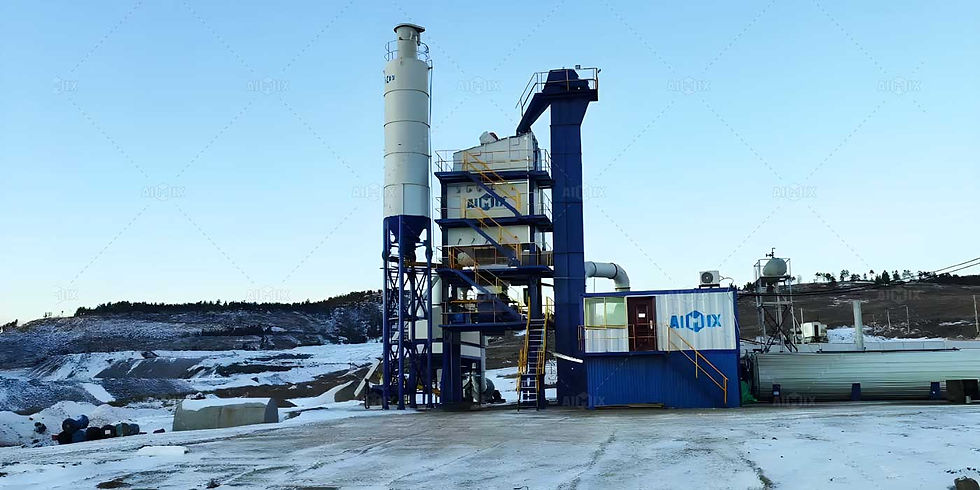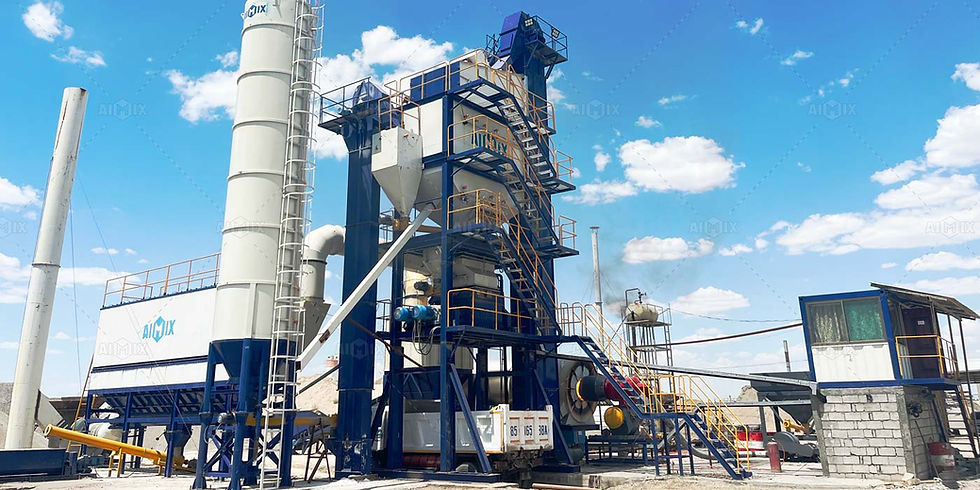Is a 40 TPH Mobile Asphalt Plant Suitable for Rotating Use Between 3 Rural Road Projects?
- aimixglobal5
- Jun 22, 2025
- 3 min read
For many contractors managing multiple small to medium rural road projects, investing in one asphalt mixing plant for all sites seems like a practical strategy. But does a 40 TPH mobile asphalt plant for sale meet the demands of rotating between three different rural projects? In this article, we’ll explore its suitability based on output, mobility, operational efficiency, and overall cost-effectiveness, helping you make the right decision for your business.

Understanding the Needs of Rural Road Projects
Rural road construction often involves shorter stretches of pavement, less traffic load, and simpler logistical setups compared to urban highways. However, it still demands timely asphalt delivery, consistent mix quality, and minimal downtime. When you're managing three such projects—possibly spread across districts—your equipment choice must balance portability and productivity.
This is where a 40 TPH portable asphalt mixing plant enters the picture. It’s compact enough to relocate with ease and powerful enough to support small to mid-scale paving work. But let’s break it down further.
Why Choose a 40 TPH Capacity?
For rotating use between rural road projects, production volume matters. A 40 TPH (tons per hour) asphalt plant can typically produce around 320 tons in an 8-hour shift. That’s enough to pave 1.5 to 2 km of rural road daily, depending on width and thickness. This output suits projects where asphalt demand ranges between 1,000–2,000 tons per site—common for village roads, access ways, and farm-to-market links.
Moreover, smaller capacity means lower fuel consumption, simpler maintenance, and easier operator training—important factors when rotating crews or working in areas with limited technical support.

Is Mobility Really a Game-Changer?
Absolutely. A mobile asphalt plant designed for frequent relocation must be mounted on wheels or skids, with folding components and fast setup systems. The 40 TPH model usually takes less than a day to assemble and disassemble—ideal for rotating between nearby sites.
For instance, if the three rural projects are within a 50–100 km radius, relocating the plant over weekends or during project downtime is both time-saving and economical. This flexibility eliminates the need for three separate plants or relying on distant commercial suppliers with high transportation costs.
Logistics, Operation, and Workforce Considerations
While moving the plant is easy, planning your logistics is essential. Before rotating, ensure each site is ready—power supply, raw materials, base foundation, and access roads must be in place. Also, your team must be trained to operate the plant efficiently in each location to avoid delays.
One practical approach is to maintain a core operational team that travels with the plant while coordinating with local labor for support. This reduces training time and ensures consistent output quality across all sites.

Cost-Efficiency and Return on Investment
Instead of investing in multiple stationary plants or paying a supplier’s markup, one 40 TPH mobile asphalt plant significantly reduces long-term costs. The initial investment is lower, and rotating use maximizes plant utilization. When properly managed, contractors often break even within a year or two, especially when asphalt production cost drops by 30–40% compared to external purchases.
Also, the flexibility to schedule paving around weather or local constraints adds another layer of control to your operations, improving project timelines and client satisfaction.
When Might It Not Be Suitable?
There are limits. If your rural projects require over 500 tons of asphalt daily, or if distances between projects exceed 150–200 km, then plant relocation becomes more complex and less efficient. In that case, higher-capacity or even semi-mobile plants may serve you better.
Still, for the majority of rural road work in regions like Southeast Asia, Africa, or South America, where daily output needs are moderate and mobility is key, a 40 TPH unit is often the ideal fit.

Conclusion: A Smart Choice for Multi-Site Rural Road Construction
So, is a 40 TPH mobile asphalt plant suitable for rotating between 3 rural road projects? For most contractors—the answer is yes. Its production capacity, quick mobility, and cost-saving potential make it a smart and practical choice for localized road building.
But remember, proper planning, crew coordination, and consistent site readiness are key to unlocking its full value. When these elements align, you’ll not only finish projects faster, but also improve margins and gain more control over quality and scheduling.
Looking for a Reliable 40 TPH Mobile Asphalt Plant?
At AIMIX, we understand what rural contractors need—reliable performance, quick deployment, and simple operation. Our 40 TPH mobile type plant asphalt is already in use across Indonesia, Malaysia, and beyond, supporting small and medium contractors who value flexibility and efficiency. We offer onsite guidance, spare parts support, and local after-sales service to keep your operations running smoothly.



Comments